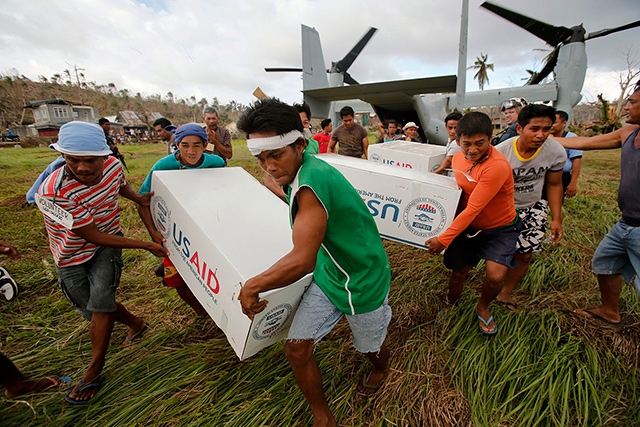Filtered By: Opinion
Opinion
Government caravans and the post-Yolanda market divide
By CARLJOE JAVIER
The last couple weeks or so has seen a lot of controversy over the government caravan selling goods at the post-typhoon disaster sites.

Prof Carljoe Javier
There isn’t anything inherently wrong with selling goods, I suppose. But the intense emotion we have for the whole situation and the idea that goods are being sold rather than donated got us to react very quickly and vehemently; like this inflammatory post.
The DTI released a statement in response, clarifying that the discount caravan is part of a regular public service program, something that has been conducted for years.
Now, I won’t be devoting this post to the good or bad of the caravan. What I want to focus on is the portrayals of the caravan, and how these reflect various positions and values. Further, I want to question the taste or propriety of conducting these caravans in the affected areas.
First, it’s clear that the initial headline was meant to rile people and get a lot of clicks. The response was immediate, and the government hadn’t engendered enough good will from a lot of people to prevent them from assuming that the government would sell relief goods. The general distrust had already been displayed not only by locals but also by international groups. We could see this in the attempts to repel politicians from gaining access to relief goods. So when this headline came out, we were already primed to assume the worst of the government.
The statement clarifies enough: they aren’t SELLING the relief goods. They are merely offering specific items that people can purchase. This is being done out of good will and the kindness of their hearts. And I will assume that those who have been endeavoring to provide these resources do mean the best for the people there. Let’s give these government workers the benefit of the doubt that they are trying to do the best in the given situation.
The problem is the subtext that is implied by offering such goods. In an area ravaged by disaster, we should be treating people the same. The spirit should be that we are all in it together. The great sympathy the country has shown, and the great sympathy the world has shown, all reveal this sense of solidarity. Now when we give everyone relief goods, but we offer caravan items to those who have the means, then we are merely reiterating the economic divides that plague our country.
I know that these economic divides won’t disappear anytime soon, and I know that the presence of the caravan won’t increase or decrease the divide in any meaningful way at present. But in the aftermath what is happening is that we are drawing the lines and making them so painfully clear.

Residents at a remote village near Guiuan, Samar transport relief boxes from US Aid carried by an Osprey aircraft of the US Navy. (Photo: Reuters/Wolfgang Rattay)
If you have the money, then you can have the better stuff.
I know that this is one of the unfortunate truths of the world we live in, but is this really the message that we want to send? Do we want the people who are receiving relief goods looking on as those who can afford it are buying more food and rebuilding their homes? The poor, most likely the hardest hit and the ones who will find it most difficult to recover and rebuild, can see how quickly the government can mobilize its resources to continue the discount caravan project (it was supposedly keeping to a schedule that had been set even prior to the typhoon).
What we’re looking at isn’t the inherent good or bad of offering relief goods, we’re looking at how bad it looks when it takes you days to get the relief goods in, but then you can keep your schedule and offer goods for sale. We’re looking at the government enabling an act that throws into stark light the economic divides that define our social relations. Did we really want to remind the poor how poor they are?
It’s all a matter of taste really. It might have made good financial sense. Heck, sounds like a good idea I suppose, bring some goods and sell ‘em to the people that can afford it. But doesn’t that sound a little bit like cashing in on tragedy? I’m not saying that’s what the DTI intended, but it can certainly be perceived as such.
Then again, this administration has had trouble with the way it has wanted to be perceived, and the way that it has acted in PR terms. We have this trouble, we have the local media portrayals pitted against revelations made by foreign journalists, we have the president walking out during a briefing to go have a smoke, we have the president blaming LGUs and others who were victims.
The government needs to work on its sense of propriety. Taste obviously isn’t the most important thing at this point. It’s the work to be done, it’s the rebuilding.
Still, we should take care in how we do things. We must remember the kind of loss and tragedy that all of the victims have survived, and I believe we must act with as much care and sensitivity as possible. That requires tact and taste. — KDM, GMA News
Tags: governmentcaravan, yolandaph
More Videos
Most Popular



